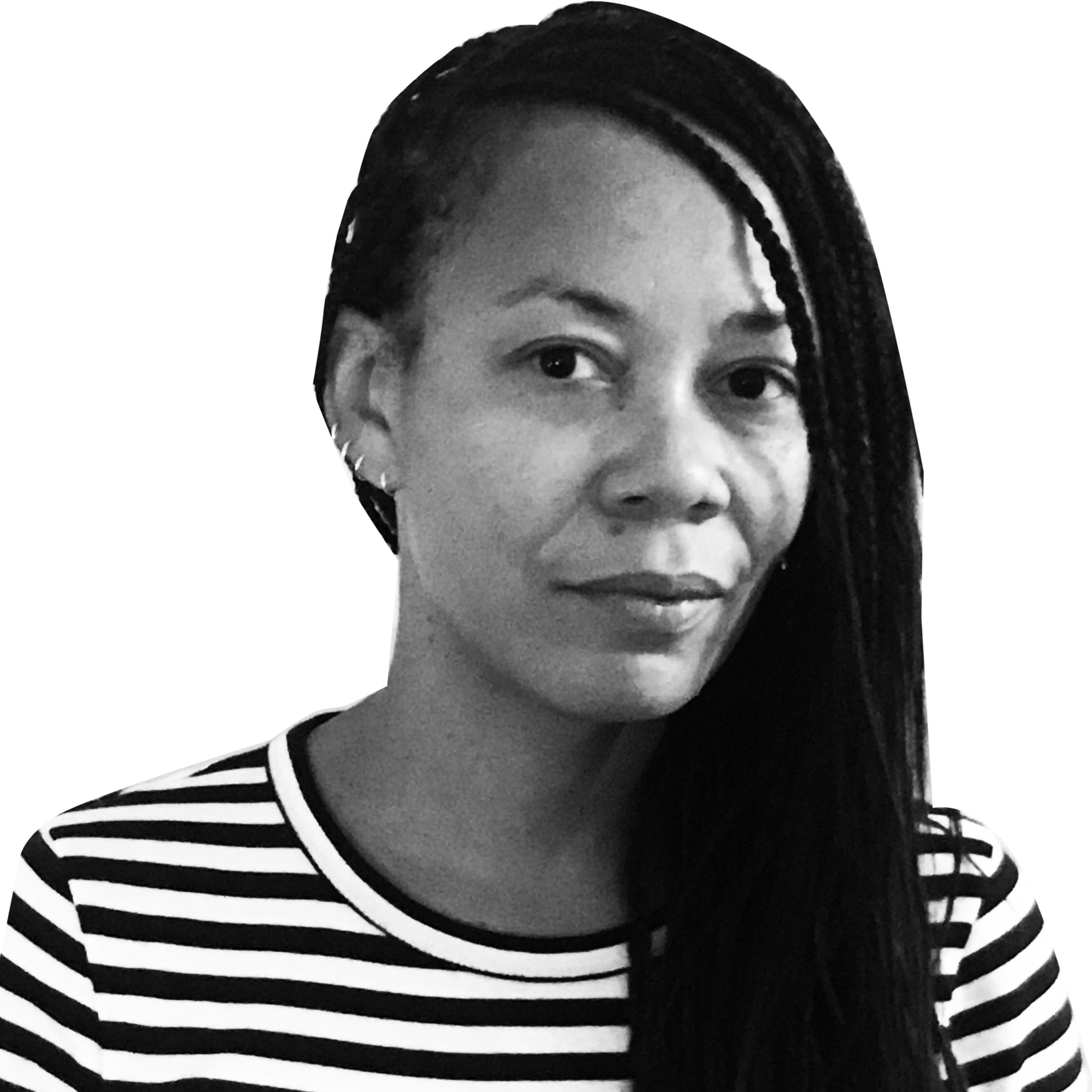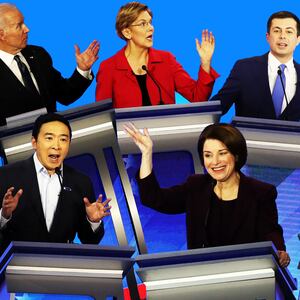Pete Buttigieg is not good at talking about black people. This is not news to Pete Buttigieg, who has spent the last few months promising to do better on addressing issues affecting black folks—only to follow up those declarations with tweets about the "American heartland," the all-purpose signifier for salt-of-the-earth white people.
You might think that on the verge of primaries in Nevada and South Carolina, two states with large populations of people of color, Buttigieg, coming off of his success in Iowa, would have been fully prepared on the debate stage Friday night in New Hampshire to discuss issues impacting black and brown communities. He was not.
ABC News correspondent and debate moderator Linsey Davis started things off by noting that during Buttigieg’s time as mayor, “a black resident in South Bend, Indiana was four times more likely to be arrested for marijuana possession than a white resident”—a disparity that worsened after he took office.
The question could have provided Buttigieg with an opportunity to discuss his firing of South Bend’s first black police chief, who had recorded white officers using racist language, as well as Buttigieg’s subsequent decision not to release those tapes. He could have taken the hit he was going to anyways, and acknowledged the ways in which his leadership had failed to recognize and adequately address structural and institutional racism in South Bend, and then talked about the work he has to do—is currently struggling to do—on matters of race. Instead, he tried to dodge the question, and, when pressed, suggested that the disparity was somehow connected to black-on-black crime and gang violence. Over marijuana arrests. In South Bend, Indiana.
It’s ironic that the answer came not long after Buttigieg, discussing the sympathetic treatment of white opiate addicts, noted that same understanding had been denied black victims of the crack epidemic in the 1990s. Ironic because his own answer sounded dated, like something a white politician would’ve said 30 years ago. It was also an especially tone-deaf answer from a candidate who has located his appeal in his youth, and the well of fresh, new ideas that come with it. He did quickly touch on the fact that we “need to change in order for us to prevent violence and remove the effects of systemic racism,” but it was too little too late.
Buttigieg stood out for how poorly he did in discussing race, a testament to how much better some—some—of the other candidates fared on the topic as that exchange extended into a sustained conversation about issues of race and equity and justice, a long overdue recognition by Democrats that black votes matter.
In one of the whitest states in the country, on a stage where six out of seven contenders were white—with Julián Castro, Cory Booker and Kamala Harris having dropped out, and another white contender, Mike Bloomberg, looming offstage—the candidates spent nearly a third of the debate in what became an extended discussion about historical and contemporary racism and oppression, and how to address those problems now. (After ABC went to a commercial break, which they delayed to keep this conversation going, the candidates moved on to other topics and never returned.)
Even a few years ago, racism in housing, criminal justice, health care, and education would’ve never have been discussed in a national forum—and reparations for slavery would never have gotten a passing mention. The fact that the candidates spent nearly a third of their time on stage addressing those issues was a step forward.
Only Andrew Yang, the sole person of color on the stage, gave an answer that landed as far from the mark as Buttigeig in what became an extended exchange between the candidates over civil rights and their appeals to voters of color. Refuting the idea that laws might be put in place help deal with racial inequities, Yang reverted to his primary talking point of universal basic income as panacea.
“You can't regulate away racism,” Yang stated, before citing the writings of Martin Luther King, stating, “he was championing... a guaranteed minimum income for all Americans of $1,000 a month or more that would end up reshaping our economy in communities of color, make it so that black net worth is not 10 percentage of white net worth in this country, which is the most important number of them all.”
It was an overly simplistic answer, however well-meaning. The racial wealth gap is just one aspect of the vast gulf separating blackness and whiteness in America. Even adjusting for income, there are massive divides in nearly outcome for white and black Americans in health care, life span, maternal mortality and home ownership. Yang’s answer revealed a sort of half-baked understanding of how racism and discrimination work in mundane, everyday ways. An additional thousand dollars a month might aid black and brown families in numerous ways, but respectability politics can’t fix racism, and UBI requires an additional package of initiatives that specifically address race-based discrimination.
I have to give credit to Elizabeth Warren—who just a day ago took the heat for an exodus of black women staffers from her Nevada campaign—for giving the best line on race of the night:
“Criminal justice should not be the only time we speak about race,” she noted as she gave a nuanced response to the question of how to deal with racial disparities, concluding ultimately that “We need to start having race-conscious laws. Housing, for example. I have a great housing plan to build more housing in America. But understand, it was the policy of the United States of America to discriminate against African-Americans and people—any other people of color—for buying homes until 1965. You can't just repeal that and say, “OK, now everything is even.” It's not. We need race conscious laws in education, in employment, in entrepreneurship to make this country a country of opportunity for everyone.”
That’s an answer only people who are apparently unfamiliar with the Voting Rights Act and Civil Rights Act consider radical.
Other candidates offered contributions that were notable for reasons both good and bad. Tom Steyer repeated his support for reparations and Joe Biden proposed that the answer here is to “increase blacks to get into the teaching...there's a lot we can do. I've laid it all out.” I don’t know where to begin or end with that answer, and neither did he. No surprises there.
The biggest takeaway? Race will likely become a bigger part of the conversation between the Democrats as the campaigns roll forward into states with far more people of color. That means they’ll need to address issues impacting black and brown folks within the larger conversation, not treat their issues as something that can be confined to its own segment. And if Buttigieg wants to keep winning, following his fractional first place win over Bernie Sanders in Iowa, he still has lots of work to do on race, and not much time left to get to it.







